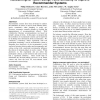Free Online Productivity Tools
i2Speak
i2Symbol
i2OCR
iTex2Img
iWeb2Print
iWeb2Shot
i2Type
iPdf2Split
iPdf2Merge
i2Bopomofo
i2Arabic
i2Style
i2Image
i2PDF
iLatex2Rtf
Sci2ools
118
click to vote
CHI
2006
ACM
2006
ACM
Accounting for taste: using profile similarity to improve recommender systems
Recommender systems have been developed to address the abundance of choice we face in taste domains (films, music, restaurants) when shopping or going out. However, consumers currently struggle to evaluate the appropriateness of recommendations offered. With collaborative filtering, recommendations are based on people's ratings of items. In this paper, we propose that the usefulness of recommender systems can be improved by including more information about recommenders. We conducted a laboratory online experiment with 100 participants simulating a movie recommender system to determine how familiarity of the recommender, profile similarity between decision-maker and recommender, and rating overlap with a particular recommender influence the choices of decision-makers in such a context. While familiarity in this experiment did not affect the participants' choices, profile similarity and rating overlap had a significant influence. These results help us understand the decision-m...
CHI 2006 | Human Computer Interaction | Keywords Recommender Systems | Particular Recommender Influence | User-centered Social Recommender |
Related Content
| Added | 30 Nov 2009 |
| Updated | 30 Nov 2009 |
| Type | Conference |
| Year | 2006 |
| Where | CHI |
| Authors | Philip Bonhard, Clare Harries, John D. McCarthy, Martina Angela Sasse |
Comments (0)

